Essential Fatty Acids & the Brain | Cognitive FX
Essential fatty acids seem to be a big fad right now. BCC Research states, “The global market for natural fatty acids sourced from vegetable oils, animal fats is projected to reach more than $25.7...
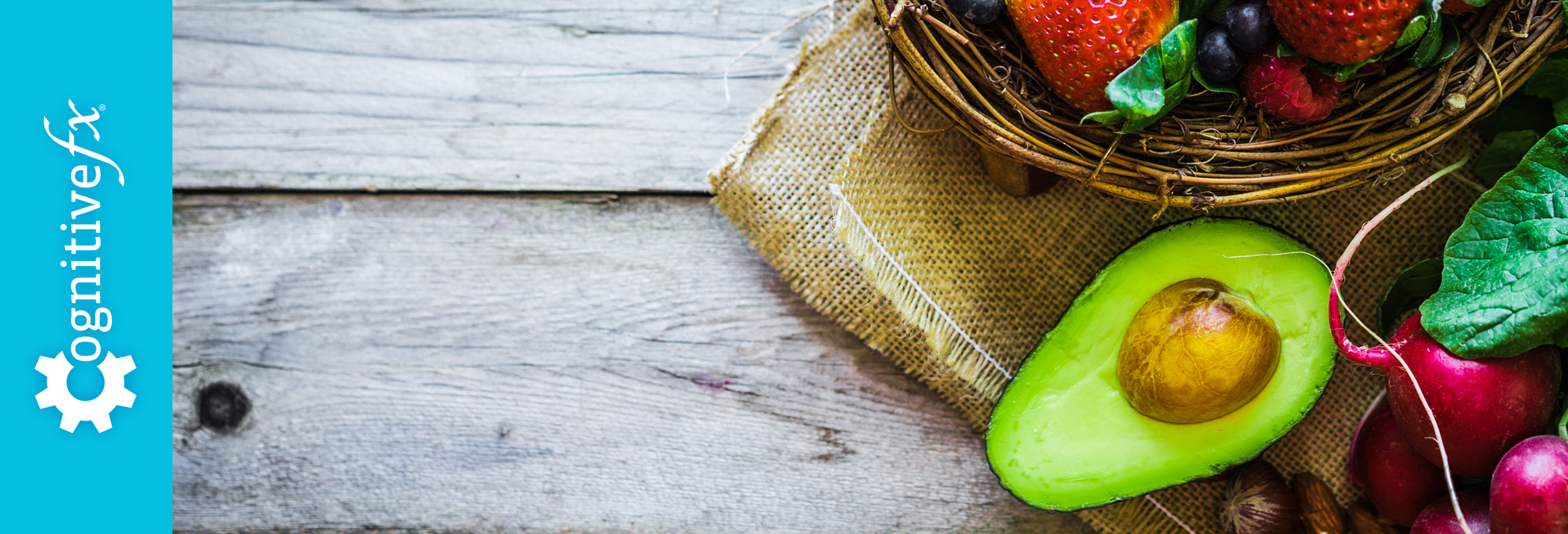
The brain is the most important organ in the human body. It regulates the profuse amount of information that the body needs to regulate itself. This includes comprehending pain levels, regulating blood pressure, controlling nervous response, creating and secreting hormones, assisting digestion, along with coordinating the countless other signals the body sends to the brain to help our body function. It is so important to give your brain the vital nutrients it needs to keep your body running in tip top shape.
Because the brain is the foundation of supporting and keeping the body healthy, it is important to understand how the food we eat influences the brain and body. Below you will find general recommendations for food that are known for their nutritional benefits to the brain. The essentials provide the body with the fuel it needs to repair cells and provide the energy needed for the day. Every body has different nutritional needs, and it is important that take the following suggestions within the context of your own needs. If you are unsure of your specific needs we encourage you to talk to a certified nutritionist.
Antioxidants and Anti-inflammatories: Antioxidants protect enzymes, fats, and vitamins in the body. Studies have shown that antioxidants can counteract unstable molecules, such as free radicals. Antioxidants also counteract the oxidative stress on the brain and may reverse some of the symptoms of aging. In the body, there are immune cells in the brain that serve as the central nervous system's primary defense.
However, over activation of these cells can lead to chronic pain, prevent healing, and lead to persistent inflammation. Luckily, there are compounds found in food that can reduce this over-activation. Antioxidants work as powerful anti-inflammatories.
Examples: Antioxidants can be found abundantly in fruits and vegetables. Dark colored berries like blueberries are rich in antioxidants. Tumeric is a great spice to fight inflammation because it contains curcumin. To learn more about the benefits of curcumin read this study published in 2017 by NCBI.
Lipids: Did you know the brain is the fattiest organ in the body, consisting of a minimum of 60% fat? In addition, fats from the bloodstream can serve as an energy source for the brain. Healthy fats, such as monosaturated and polyunsaturated fats, also promote good blood circulation because they are anti-inflammatory in nature. To learn more about these fats read this study published in May of 2015.
DHA omega-3 and Omega-6 fatty acids are known to fight memory loss, depression, improve sleep quality, vision, and improve the number of molecules that increase neuronal growth and survival. Omega-6s are also often used to increase good cholestrol or high-density lipoprotien, which serves as a building block for the steroid hormones that affect metabolism, inflammation, immune function, and salt/water balance. We wrote a post that details the benefits of DHA Omega-3 and Omega-6s has on the brain.
Examples: Oily fish (salmon and sardines) nuts, and seeds are just a few food types that are high in healthy fat the body needs.
Proteins and Amino Acids: To function adequately, the central nervous system (CNS) requires a number of amino acids found in protein rich foods. There are twenty different groups of amino acids; you can learn more about amino acids here. The two groups we will be focusing on are aromatic and acidic. Aromatic amino acids are used by the brain for the synthesis of various neurotransmitters and neuromodulators, such as serotonin and dopamine. Acidic amino glutamate and aspartate are neurotransmitters themselves.
Examples: Amino acids can be found in many different types of food, such as nuts, seeds, beans, and meat.
Carbohydrates: Growing and sustaining our large human brains takes a lot of energy; as a result, our brains eat up a large share of the energy we get from food. Carbohydrates, with their high nutrient and energy density, in part allowed us to evolve our amazing brains and provide us with energy.
Examples: Carbohydrates can be separated into two main categories: simple and complex. many whole grains, fruits, and vegetables fall within the complex category. Research depicted in this study published in 2008, shows that complex carbohydrates can reduce the risk for disease and improve cognition.
Water & Sodium Balance: It is vital to pay attention to how much salt and water you are consuming. It is common for individuals to experience irregular water and sodium homeostasis. The American Heart Association recommends eating no more than 1500mg of sodium daily. However, staying under this amount can be tricky because salt hides in many processed foods!
Approximately 73% of the brain is water. Molecular hydrogen found in drinking water works as an antioxidant; reducing neuro-oxidative stress and inflammation. Hydration promotes an array of cognitive benefits, such as, alertness, energy, memory function, visual vigilance, and improved circulation.
To figure out how much water you need to consume on a daily basis to maintain proper hydration follow this simple calculation: Your weight x 0.5 = the number of ounces of water required per day. However, you may need more or less than you actually need depending on genetics, diet, environment, and physical activity levels.
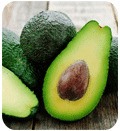
1- Avocados
Avocados are made up of healthy fats. These generally support healthy blood flow, which in turn support healthy brain function. We wrote a post about all of the amazing nutritional powers an avocado has on brain and body health.
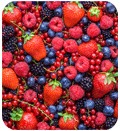
2- Berries
Blueberries, Raspberries, Blackberries, Cranberries, and Strawberries will not only bring the benefits of antioxidants, but also help to reduce inflammation and improve signaling in the brain, according to a recent study by the Human Nutrition Research Center on Aging.
3- Dark Chocolate
Dark chocolate provides antioxidants for the body to help reduce oxidative stress that can be damaging to both brain and body. Dark chocolate also increases the production of endorphins and can contribute to having a better mood. It also contains flavanol, which has been shown to assist in memory loss prevention.

4- Wild Salmon
Salmon is good for your body and brain because of the benefits that come from DHA Omega3. DHA is an essential fatty acid that helps support the tissue of the brain. DHA also supports overall brain performance and makes up about 97% of the omega 3 fatty acids in the brain.
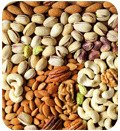
5- Almonds, Cashews, Pecans, Macadamia Nuts,and Walnuts
Nuts are a great source of a variety of vitamins. Not all nuts provide the same benefits. For example, walnuts are good for the brain because they have higher levels of DHA, which is important for brain health. Harvard recently found that those who eat nuts on a daily basis have a 20% lower death rate.
These 5 types of foods are a good start to healthy brain nutrition. There are many foods that are also beneficial for brain health including a variety of fruits and vegetables, protein, and whole grains. The idea is that by eating a balanced diet you can support not only the structure of the brain but also the function. We have provided a chart that alphabetizes all of the nutrient-rich foods you can incorporate into your diet (if you are already not consuming them) to help boost that brain power.
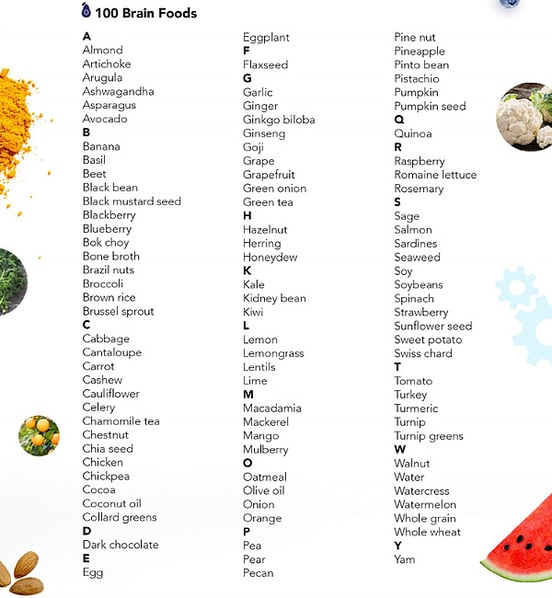
Like a car, we have to put the right kind of gasoline in the car in order for the engine to operate smoothly, and we have to fill up the car repeatedly to make it to our destination. If we are not feeding our bodies the proper nutrients and sufficient food it needs to function and work consistently, we will likewise run out of gas or not have a smooth ride to our destination.
Nutrition is just one piece of the puzzle in supporting and keeping the brain healthy. There are other pieces too, like physical exercise, hydration, getting enough sleep, having a positive attitude, and more. But it is important to never forget how important nutrition is for helping our brain so we can have a better quality of life, empowering us to accomplish all of the things we set out to do!

The "Cognitive FX Team" is a collaborative ensemble of distinguished doctors, therapists, and practitioners. Our experts are pioneers in the field of neuroimaging and concussion treatment. With extensive experience and a strong commitment to patient care, our team excels in utilizing cutting-edge technologies, such as functional MRI (fMRI), to provide personalized diagnostic and treatment strategies. Our renowned professionals have published groundbreaking research, developed innovative neuroimaging biomarkers, and conducted thousands of individualized patient assessments. We take pride in our holistic approach to patient care, focusing on physical, cognitive, and emotional aspects of recovery. As leaders in the industry, the Cognitive FX Team is dedicated to advancing the science of concussion diagnosis and treatment to provide our patients with the highest level of care and support.
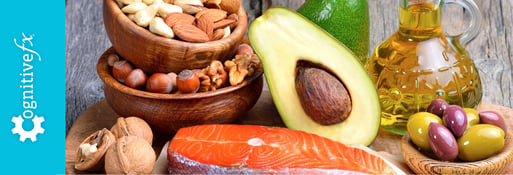
Essential fatty acids seem to be a big fad right now. BCC Research states, “The global market for natural fatty acids sourced from vegetable oils, animal fats is projected to reach more than $25.7...

“Eat right and exercise” – this advice is nothing new, you’re tired of hearing it and you’re tempted to tune it out right now – but it’s not going away. In fact, when it comes to brain health, this...
Published peer-reviewed research shows that Cognitive FX treatment leads to meaningful symptom reduction in post-concussion symptoms for 77% of study participants. Cognitive FX is the only PCS clinic with third-party validated treatment outcomes.
READ FULL STUDYPublished peer-reviewed research shows that Cognitive FX treatment leads to meaningful symptom reduction in post-concussion symptoms for 77% of study participants. Cognitive FX is the only PCS clinic with third-party validated treatment outcomes.
READ FULL STUDY